
Atonom - Sustainable living, Resilient communities
Atonom is developing a system to make sustainable development more accessible.

Atonom – Sustainable living and resilient communities.
Atonom is developing a system to make sustainable development more accessible. By combining different sustainable development models, and enabling the measurement of their impact, users can find methods and financing for targeting the needs of their community. This enables sustainable development to be accessible to everyone and not only those with the financial capacity to benefit from it. We are seeking funding to raise awareness, seek feedback, test the model, and improve it.
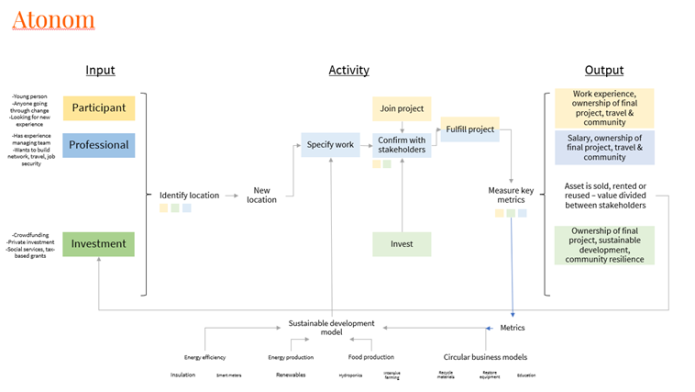
Planetary boundaries are being surpassed, leading to climate tipping points that threaten to spiral out of control.
Planetary boundaries (Rockström et al. 2020) are theoretical limits to what the planet can tolerate before reaching climate tipping points. Climate tipping points (O’Grady 2022; Senge 1994) are when one set of events leads to a set of self-reinforcing, uncontrollable events. Typical examples include the Amazon rainforest turning into savannah (Amigo 2020), or warm-water corals, and carbon release from thawing permafrost (Armstrong McKay et al. 2022) This further increases the heat, leading to more CO2 being released. This causes a self-reinforcing temperature rise, which threatens spiraling out of control. As such, humanity needs to change. While we might short term be able to sustain ourselves in this current state – we risk spiraling out of control in unpredictable ways if we continue in existing ways.
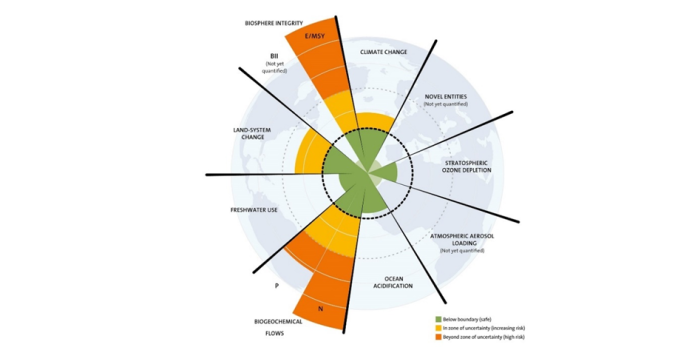
Figure 1 - Planetary boundaries
To efficiently work with sustainable development, poverty needs to be tackled first.
If sustainable development policy primarily benefits the rich, then poor or less developed countries with a historically lower consumption will not support policies aimed at reducing CO2 (Dixson-Decleve et al. 2022). Additionally, if existing CO2 consumption in Western countries lead to climate breakdown in southern countries, they will have to invest more in staving off climate change, instead of for example investing in education for their children. This leads to a reduced cooperation and trust both in and between countries, which makes it more difficult to work with sustainable development.
Without majority support, sustainable development policy will not work out.
Everyone needs to benefit from sustainable development policy. If policy and investment does not benefit everyone, but only those with access to it, public support for sustainable development will be undermined. If sustainable development policy leads to tax increases for petrol – which hurts people living in rural areas, while affecting those living in cities less, public support for climate policy will falter. If initiatives mostly benefit urban areas and a richer population, while rural or immigrant population miss out, public support for policy will be lost. If public support for sustainable development is not sustained, then sustainable development will not happen. As such, everyone needs to benefit from sustainable development for it to be able to be implemented long term
How can everyone benefit from sustainable development?
We believe that, by giving people the technology and resources needed to implement it on their own, more can see the benefits of sustainable development. If methods and financing for improving the community are more easily accessible, it will be easier to implement. This will in turn lead to a greater perception of sustainable development policy.
Different areas will have different problems to work with (Raworth 2018). Some areas will have more need to work with poverty, whereas others will have more need to work with clean air, or clean water for instance. By allowing different models with different metrics, users can pick and choose their solutions on their own, and then work together with others to implement them in their local communities.
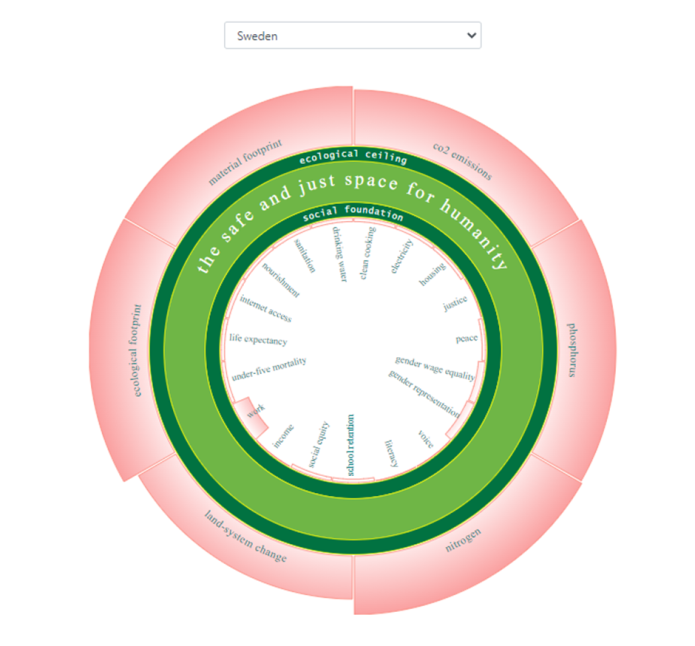
Figure 2 - Social and Ecological foundations of Sweden (Raworth; Surjadaja 2022)
Atonom is developing a system enabling communities to implement sustainable development by their own initiative.
By combining different models for achieving different goals, sustainable development can be implemented from the bottom up. These models can then be measured during their implementation, allowing a comparison of the efficiency, and allows implementing the models in different areas, achieving different aims. If sustainable development can be made more accessible, through a greater availability of financing and models for implementation, then the trust that sustainable development can benefit everyone and not just the rich. This will allow a continued effort to work in a positive direction forward, together, and in ways that do not only benefit the rich, but everyone.
This creates tangible rate of progress - reduces social tension - increases average wellbeing - increases the progress, then creating trust for further policy. As such - getting this going is much like making the stone start rolling, leading to a self-reinforcing, positive feedback loop. However, it's going to require a big push!
The person that joins Atonom, would get a list of different models for different locations, and then they would be able to see the different impact of those models, and how it relates to the planetary boundaries. Locations would have different models to apply based on problem areas and resources available for the location. They would then be able to invite others to join this business model. To finish the model, you would need financing, as well as metrics that you would like to watch. Taking part of setting the model up would lead to part ownership of the final model. Taking part of the model would imply either setting it up or funding it.
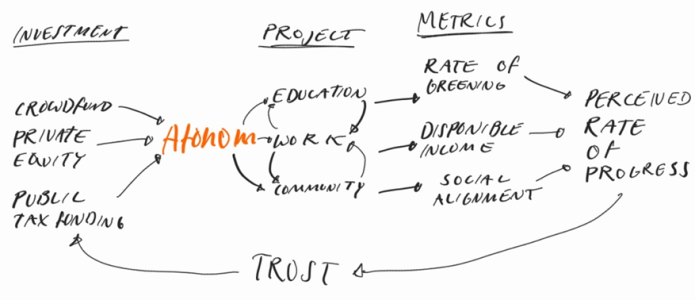
Together, this could enable communities to target different areas requiring different resources for different locations – and see their implementation through. Participants can then measure the benefits of the models, and others can implement them also in their locations. Users can get greater access to financing, as the risk of investment is reduced when the investment is both measured and possibly crowdfunded from locals.
What we intend to do
With any funds received, we intend to continue development of the method. This includes strengthening its scientific foundation, making it more user friendly, and testing it. The scope of this will vary with funding received. We would like to be able to come together and work together to develop this.
Who we are
William Lodén - Founder & CEO
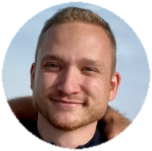
MSc Business Development - Grenoble School of Management

BSc Business & Economics - Uppsala University

Mathews George

MSc Business Development - Grenoble School of Management

Anass Habib

MSc Business Development - Grenoble School of Management.

With support from
Milton – Head of Security

Woof
Andres Zuniga Cabrera
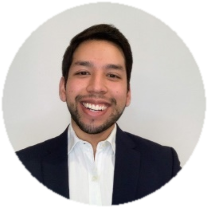
Jean Paul Aussel
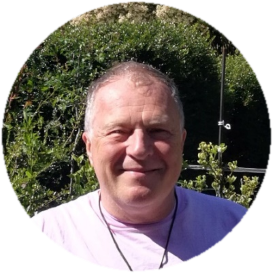
Project and Business developer following 10 years of Academic/Consulting Program Management, 15 years of Executive Management, International Relations and high-level negotiation experience and a 15-year career in manufacturing, technology transfer and R & D.
Member of Atonom.io. Connect with me there whatever you may wish to explore.
Specialties: Complex Major Private and Public Project development with Project Financing. Government support to Industrial Development. Multicultural teams. Mining and Metals. Start-up and SME's development.
Dima Louis
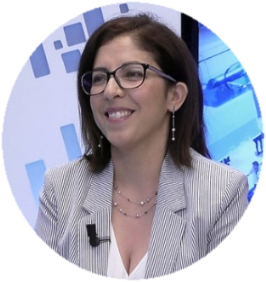
Dima Louis, DBA, is a researcher, executive coach, and consultant. She holds a Doctorate in Business Administration from Grenoble Ecole de Management, a Master’s degree in Occupational Psychology and is certified in Occupational Testing by the British Psychological Society. She received the Harnisch Grant in support of her DBA thesis which examines the issue of multiple stakeholders and agendas in executive coaching.
She has published articles both in English and in French, and presented papers at several coaching conferences. Her research interests include executive coaching, power dynamics and politics in organizations, pathogenic relationships and dysfunctional roles in the workplace, and the relationship between art, leadership and business practices.
Risks and challenges
The primary challenge will be to iterate for long enough to come to a product that’s accepted by the market.
We see a macro-economic risk with interest rates, climate change and war. Atonom will remain flexible and adjust our services according to what the market needs. Our intent is to remain customer driven - by the user, for the user.
Other ways to contribute
- Try out the platform!
References
Amigo, Ignacio. 2020. “When Will the Amazon Hit a Tipping Point?” Nature 578 (7796): 505–7.
Armstrong McKay, David I., Arie Staal, Jesse F. Abrams, Ricarda Winkelmann, Boris Sakschewski, Sina Loriani, Ingo Fetzer, Sarah E. Cornell, Johan Rockström, and Timothy M. Lenton. 2022. “Exceeding 1.5°C Global Warming Could Trigger Multiple Climate Tipping Points.” Science (New York, N.Y.) 377 (6611): eabn7950.
Dixson-Decleve, Sandrine, Owen Gaffney, Jayati Ghosh, Jorgen Randers, Johan Rockstrom, and Per Espen Stoknes. 2022. Earth for All. Gabriola Island: New Society.
O’Grady, Cathleen. 2022. “Warming of 1.5°C Carries Risk of Crossing Climate Tipping Points.” Science (New York, N.Y.) 377 (6611): 1135.
Raworth, Kate. 2018. Doughnut Economics. London, England: Random House Business Books.
Rockström, Johan, Almut Beringer, Beatrice Crona, Owen Gaffney, and Daniel Klingenfeld. 2020. “Planetary Boundaries.” In Sustainable Investing Sustainable Investing A Path to a New Horizon, 109–28. First Edition. | New York : Routledge, 2020.: Routledge.
Senge, Peter M. 1994. Fifth Discipline. Random House Audio Publishing Group.
Share
Tags
Share
-
Member

Egil Petter Stræte
Oslo, Norway
-
Member


Walled Ashwah
egypt
Eng / Walled hassan AL ashwah Egyptian national, 45 years old, environmental researcher at the Egyptian Ministry of Environment since 2005 Author of sustainable development between theory and practice book in Arabic language was puplished at 2017 He participated in many international and local conferences such as the International Conference on Ecotourism, the Medical Waste Conference at Mansoura University, the World Conference on Sustainable Development in India, the Conference on Sustainable Management of Plastic Waste in India, the Gender Equality Conference sponsored by the Rural Development Authority, Dedan University in India, and the New Republic Youth Forum and Climate 2022 He also held many seminars in cooperation with Mansoura University, Al-Azhar, schools and companies such as GASCO, the Arab Contractors, the UNESCO Club, the International Organization for the Protection of Wildlife (CITES), the United Nations Office in Cairo, the Arab Federation for Sustainable Development and the Environment, the Agricultural Professions Syndicate and civil society organizations. He obtained many accredited certificates from international and local bodies, such as a certified trainer from the International Federation of Sustainable Development Experts in England, and one of the five best ambassadors for sustainable development from King Hussein University in Malaysia, and the environment and climate ambassador from GECCI in Nigeria for two years 2022 to 2024 and the best teacher An environmentalist from the ETC Center in Sweden, and one of the most influential figures in 2020 from the Al-Ahram International Center, a sustainability specialist and writer of the scientific material for the play The Tale of a Planet He also received the medal of an initiative researcher from the platform of scientists, researchers and experts, and a member of the International Federation for Sustainable Development, and a member of the platform of scientists, researchers and experts and the Sustainable Development Network in Malaysia
-
Member

Tesia Lin
-
Member


Sydney Groesbeck
United States
-
Member

Shikher Gupta
India
-
Member


William Lodén
Uppsala, Sweden
Hi! I created Atonom as a response to what I see as an unsustainable addiction treatment industry in Sweden. More and more I am coming to see the value of resiliency and sustainability thinking.
